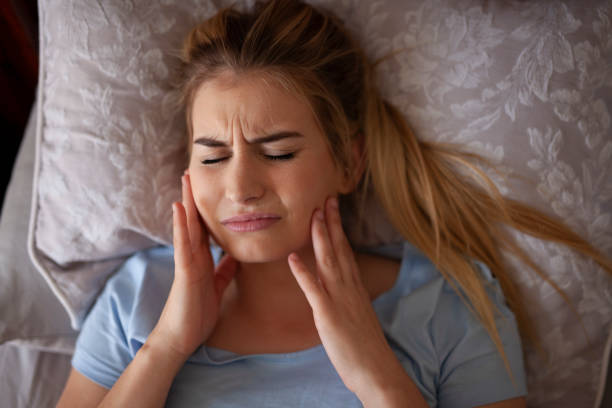
We tend to overlook the temporomandibular joint’s function and purpose until it gives us reason to be concerned. If this important joint becomes injured or infected, it can lead to many problems with our ability to speak and chew properly. When you experience discomforts such as muscle pain or headaches when trying to open and close your mouth, you may be suffering from a temporomandibular joint disorder, also called TMD.
Our oral surgery office understands the frustration of discomfort extending to the back and shoulders, so we use our extensive knowledge to treat the aches and pains associated with TMD.
Understanding temporomandibular disorders
In front of each ear, the temporomandibular joint connects your jaw to the temporal bones of your skull. It allows you to move your jaw up and down and side to side, allowing you to talk, chew, and yawn. You may occasionally feel pain in your jaw area, or your dentist or doctor may have diagnosed you with TMD. The temporomandibular joint and chewing muscles are affected by TMD, which is not just a single disorder, but a group of painful conditions.
What Causes Temporomandibular Dysfunction (TMD)?
There is no single cause for TMD. Almost anything that causes tension in the jaw and temporal muscles can lead to TMJ problems. Often, multiple factors contribute to the disorder. Injuries to the jaw, face, head, and neck are some of the most common causes of TMD pain.
Teeth grinding or jaw clenching:
Bruxism occurs when you unconsciously clench your jaw or grind your teeth. The condition affects some people while they are awake, generally due to stress or concentration, while other people experience it while sleeping. Because of the intense pressure being put on your teeth, your bite position can change over time. The result is jaw misalignment, which leads to other associated problems like TMD.
Sleep Disorders
Sleep apnea occurs when your airway collapses while you’re asleep, preventing you from breathing. To open the airway, the lower jaw will clamp down or thrust forward, causing additional stress that will result in TMJ discomfort.
Arthritis
Quite often, individuals with arthritis throughout the body will experience arthritis of the TMJ.
Stress
Stress is often regarded as a major cause of TMD, as it influences involuntary movements throughout the body, such as teeth clenching and grinding, and tension in the neck, head, and shoulders.
Symptoms and Signs
Since TMD consists of several complications, it may be accompanied by a variety of symptoms. The most common symptom of TMJ disorder is pain, especially in the chewing muscles and/or jaw joint.
Other symptoms may include:
- The jaw is locked or limited in movement.
- Pain that affects the jaw, face, neck, and shoulders
- Opening and closing the mouth causes unpleasant popping, clicking, or rough sounds.
- A sudden change in the position of the upper and lower teeth
- Migraines and headaches
- Earaches
- Dizziness
- Hearing difficulties
Treatment of TMJ
Because TMD issues tend to be temporary and often do not get worse, simple treatment may be sufficient to relieve discomfort, including
- Physical therapy that focuses on stretching and relaxing muscles.
- The short-term use of muscle relaxers and anti-inflammatory
- Night-guards
- Splints
Although conservative therapies are helpful for temporarily relieving pain and muscle spasms, they are not a “cure” for TMD. Surgery may be an option if other treatments are not sufficient, such as
- The injection of pain relievers with treatments such as BOTOX®
- A modified condylotomy procedure can be used to reduce or prevent jaw locking.
- Repositioning the TMJ disc with a procedure called a discectomy
TMD not only affects your day-to-day life but also your oral and overall health. TMD treatment restores normal jaw function and relieves joint stress so that you can return to your normal life.
Our oral surgery practice provides compassionate, innovative, and experienced treatment for TMD patients. If you would like more information about our TMD treatment options, we encourage you to contact us today to schedule a consultation appointment.






